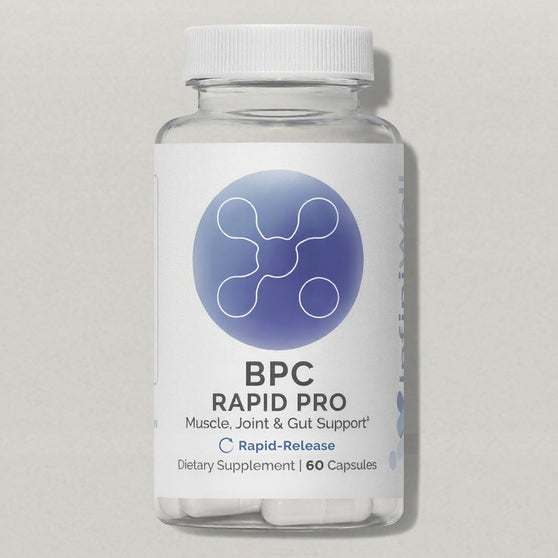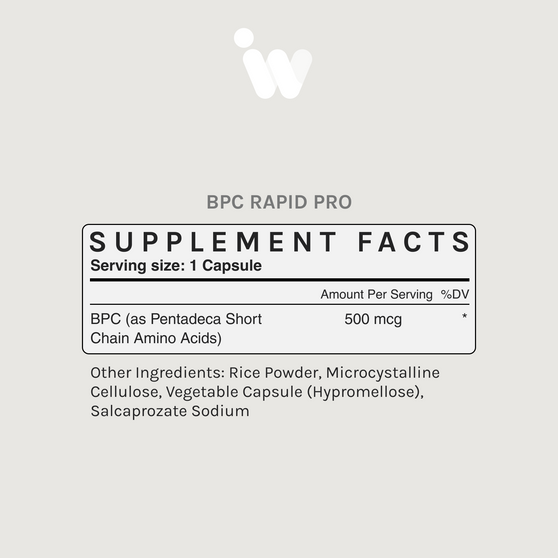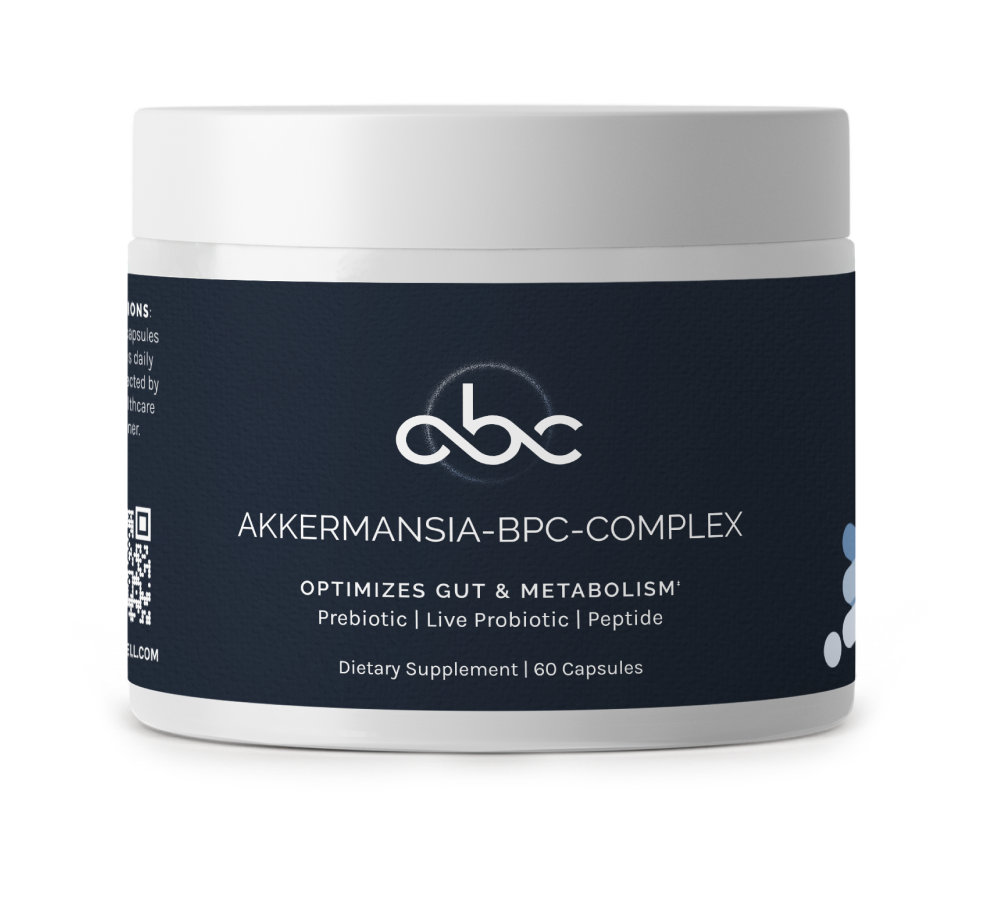Key takeaways
-
Although often linked to bodybuilding and physical performance, peptides actually support a wide range of biological functions—many of which are tied to skin health and longevity.
-
Peptides may support healthy aging at the cellular level. Some peptides send signals that encourage collagen production and skin cell turnover—processes that naturally slow down with age.
-
Skincare is a practical entry point for peptide use. Topical products like peptide serums combine peptides with hydrating and antioxidant-rich ingredients to target skin aging concerns such as sagging skin, fine lines, and diminished tone.
-
Peptide formulas that include moisture-supportive agents (like glycerin and sodium PCA), antioxidants (like vitamin C), and stabilizers (like xanthan gum) may offer more comprehensive skin support, especially when packaged in glass bottles to maintain stability.
-
Peptides work best when used consistently, especially as part of both your AM and PM routines. While they’re not miracle solutions, they can support long-term skin health and may contribute to visible improvements when combined with other effective ingredients.
-
Not all peptides are risky or injectable. While some products raise safety concerns—particularly those from unverified sources—many topical and oral peptide formulations are developed with safety in mind. Manufacturers are accountable for ensuring that safety, even though these products aren't subject to drug-level pre-approval.
Peptides have become a buzzword in wellness, but most people still think of them in one specific way. Ask someone in the fitness world, and they’ll probably talk about muscle gains, post-workout benefits, or performance enhancers that skirt the rules. That’s the version most people hear about.
But that’s only part of the story.
Peptides are tiny protein fragments that help your body send signals to cells, tissues, or organs, guiding everything from cell activity to hormone release. They’ve always been part of how the body works. The only new thing is how people are starting to use them.
So the real question isn’t do peptides work? It’s what are they really for? And can they actually support things like aging well or keeping your skin and body functioning at their best?
What the critics say
Peptides have picked up a mixed reputation, and it’s not hard to see why. Here are some of the most common concerns:
They’re just for bodybuilders

The connection between peptides and performance enhancement in sports has long dominated the conversation, overshadowing other uses. In skincare, for example, peptides are now found in products such as lightweight serums, eye creams, and moisturizers designed to support healthy skin and address concerns like fine lines and wrinkles.
They’re unsafe or unregulated
Some peptides are sold through questionable sources online, often with little to no ingredient transparency, quality assurance, or clear sourcing. Without proper oversight, these products may lead to irritation, inconsistent results, or uncertain safety profiles—especially when not used as directed or combined with unknown compounds.
In contrast, reputable formulations tend to include key ingredients that support product stability and intended use, with safety rigorously evaluated during development.
They have unknown long-term effects
Some peptides—especially newer or research-stage compounds—don’t yet have extensive long-term data in humans. That said, many are used in controlled amounts, and their safety is closely monitored when formulated for topical or oral use.
In cosmetic applications, peptides are typically intended for surface-level benefits like hydration, smoothness, and tone. Because they aren’t designed to influence internal systems, the potential for long-term risk is generally lower compared to compounds that affect the entire body.
They’re all injectables
The idea of self-injection understandably turns people away, especially when the goal is graceful aging, not athletic enhancement. But peptides now show up in everyday skincare routines through multi-weight hyaluronic acid blends, oil-based serums, and products tailored to tackle dryness, pores, and skin texture—no injections required.
All of these concerns aren’t unfounded, but they also don’t tell the whole story. Peptides can serve a much broader purpose, especially when sourced responsibly and used in well-formulated products, whether topical or oral.
From supporting visible skin health to contributing to gut, vascular, or cellular function, their safety and efficacy depend on thoughtful formulation and intended use.
What’s missing from the conversation
Yes, there are risks with unsupervised use. But painting all peptides with the same brush ignores the wide range of compounds being studied—and how different they can be in form, purpose, and effect.
Peptides come in more than one form
Peptides aren’t a single ingredient—they’re short sequences of amino acids, and different types serve different purposes. Some are injected. Others come in capsule form or as liquid peptides taken orally. And many are now featured in topical formulations like peptide serums or peptide complexes, often paired with ingredients like:
-
Sodium hyaluronate for hydration
-
Butylene glycol for texture and absorption
-
Cleansing enzymes to clear surface buildup
-
Antioxidants to protect against environmental stress
Peptides for longevity and healthy aging
Their uses also extend beyond muscle or performance. A growing number of peptides are being studied for how they may support healthy aging at the cellular level, especially when it comes to mitochondrial function, skin elasticity, gut barrier health, and even cognitive support.
While much of this research is still ongoing, it reflects a broader shift: using peptides to support how the body ages—not trying to hack or reverse it.
Some examples include:
-
GHK-Cu: Common in skin formulas, GHK-Cu is a copper peptide that helps maintain skin firmness and elasticity.
-
BPC-157: Though originally researched for gut health, BPC-157 is being explored for its potential to support tissue and vascular integrity.
-
Zinc thymulin: Thymulin is a thymus-derived peptide that, when combined with zinc, forms a peptide–mineral complex studied for its potential to support hair density, scalp health, and age-related hair concerns.
-
Matrixyl: Often found in anti-aging serums, it's known for targeting visible signs of aging like fine lines and texture changes.
Also read:
Longevity peptides without the needle
If the thought of injections makes you hesitate, plenty of people feel the same way. Topical peptide serums offer a gentler, more approachable way to start.
In skincare, peptides are often used in combination with antioxidants, hyaluronic acid, and other hydrating ingredients to target visible signs of skin aging, such as fine lines, texture changes, and diminished tone. While these serums don’t reach as deep as injectables, they offer a practical, low-risk way to explore peptides in a familiar format.
Note: Injectable peptides may offer more direct effects, but they also involve more unknowns—which means they're better suited for supervised, clinical use.
Also read:
-
Peptides for Skin: What Are They, and How Do They Benefit Your Skincare Routine?
-
The Busy Person’s Guide to Wellness: How Peptides Fit Into Your Fast-Paced Life
-
How to Choose the Right BPC-157 Peptide: Everything You Need to Know
Rethinking peptides beyond the hype and hysteria
Peptides won’t turn back the clock. And yes, some uses have raised valid concerns. But that doesn’t mean they’re ineffective—or risky across the board.
When responsibly sourced and used in the right form, certain peptides may support healthy aging, not by trying to “stop” the process but by helping the body function well through it. That might mean maintaining skin structure, preserving energy production, or encouraging better cellular communication.
Peptides for longevity: Start smart, not scared
The world of peptides is more layered than the headlines suggest. On one end, you have questionable powders and unregulated products sold in unlabeled containers. On the other, you’ll find thoughtfully developed serums and early-stage compounds being explored for their potential to support aging and long-term health.
If you’re considering peptides, start with the science—but let your own goals and comfort level shape the path.
Glossary
Key terms to know:
-
Amino acids: The building blocks of proteins and peptides; essential for many biological functions, including tissue structure and signaling.
-
Copper peptide: A form of peptide bound to copper, often included in anti-aging products for its potential to support skin renewal and firmness.
-
Expression lines: Fine wrinkles that form from repeated facial movements, commonly targeted by anti-aging skincare products.
-
Hyaluronic acid: A moisture-binding ingredient that helps attract water to the skin, supporting smoother texture, better hydration, and flexible skin feel.
-
Mitochondrial function: The process by which cells produce energy; considered essential for cellular health, longevity, and overall metabolic activity.
-
Patch testing: A way to test a new skincare product on a small area before applying it more broadly, especially important for those with sensitive or reactive skin.
-
Peptide serum: A topical skincare product formulated with peptides to support skin firmness, hydration, and overall appearance.
-
Peptides: Short chains of amino acids that act as messengers in the body, supporting processes like collagen production, cell communication, and skin structure.
-
Sensitive skin: A skin type prone to irritation or redness, often requiring gentle or fragrance-free formulations.
-
Skin elasticity: The skin’s ability to stretch and return to its original shape; contributes to a smooth, firm appearance.
-
Vitamin C: An antioxidant that helps protect skin from environmental stress, brighten skin tone, and support collagen synthesis.
-
SOURCES





















